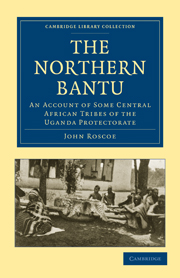Book contents
- Frontmatter
- PREFACE
- Contents
- LIST OF ILLUSTRATIONS
- Uganda and British East Africa
- PART I THE BANYORO A PASTORAL PEOPLE
- PART II THE BANYANKOLE A PASTORAL TRIBE OF ANKOLE
- CHAP. X THE COUNTRY AND PEOPLE
- CHAP. XI GOVERNMENT, CLANS AND TOTEMS, MARRIAGE
- CHAP. XII BIRTH CUSTOMS, SICKNESS, DEATH AND BURIAL
- CHAP. XIII RELIGIOUS BELIEFS, HUNTING, COUNTING AND DIVISION OF TIME, MUSIC AND GAMES
- PART III THE BAKENE, LAKE DWELLERS
- PART IV THE BAGESU A CANNIBAL TRIBE
- PART V THE BASOGA
- PART VI NILOTIC TRIBES. THE BATESO AND THE KAVIRONDO
- INDEX
- PUBLICATIONS OF THE CAMBRIDGE UNIVERSITY PRESS RELATING TO AFRICA
- Plate section
CHAP. XI - GOVERNMENT, CLANS AND TOTEMS, MARRIAGE
Published online by Cambridge University Press: 07 September 2011
- Frontmatter
- PREFACE
- Contents
- LIST OF ILLUSTRATIONS
- Uganda and British East Africa
- PART I THE BANYORO A PASTORAL PEOPLE
- PART II THE BANYANKOLE A PASTORAL TRIBE OF ANKOLE
- CHAP. X THE COUNTRY AND PEOPLE
- CHAP. XI GOVERNMENT, CLANS AND TOTEMS, MARRIAGE
- CHAP. XII BIRTH CUSTOMS, SICKNESS, DEATH AND BURIAL
- CHAP. XIII RELIGIOUS BELIEFS, HUNTING, COUNTING AND DIVISION OF TIME, MUSIC AND GAMES
- PART III THE BAKENE, LAKE DWELLERS
- PART IV THE BAGESU A CANNIBAL TRIBE
- PART V THE BASOGA
- PART VI NILOTIC TRIBES. THE BATESO AND THE KAVIRONDO
- INDEX
- PUBLICATIONS OF THE CAMBRIDGE UNIVERSITY PRESS RELATING TO AFRICA
- Plate section
Summary
The king's estimation of wealth. The Bahima will recognise no man as king who is not of the blood royal, and it is absolutely impossible for a woman to rule. Contrary to the usual custom of kings and of the tribes surrounding Ankole, the king does not reckon his greatness by the area of his kingdom nor by the number of his subjects nor yet by the amount of land cultivated, but by the cattle he possesses. His chiefs are appointed to rule a certain number of cattle with lesser chiefs under them. True each chief has a district over which his cattle roam. Such boundaries, however, are only guides which serve to separate each chief's cattle from those of other chiefs and to prevent disputes between the herdsmen as to the best places for pasturing their herds. The land is not regarded as of any value apart from the qualities of pasturage. Neither the king nor people ever talk of the land as belonging to any particular chief; his chieftainship is always described in terms of the number of cows he has under his control. What the land is to other kings and chiefs, so their herds are to the Bahima.
Difficulty in obtaining names of kings. Owing to the custom of avoiding any mention of the dead and of removing the name of a departed king from the language, should it be the name of something in ordinary use, which thereafter receives a new name, it has been found impossible to obtain a very reliable list of their kings.
- Type
- Chapter
- Information
- The Northern BantuAn Account of Some Central African Tribes of the Uganda Protectorate, pp. 110 - 122Publisher: Cambridge University PressPrint publication year: 2010First published in: 1915



